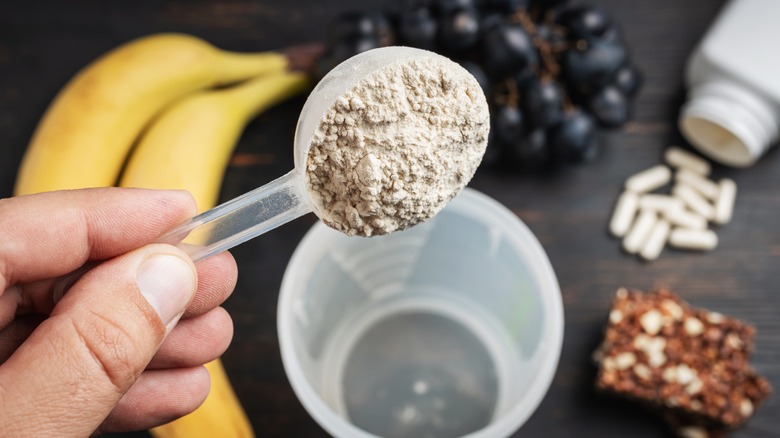When You Eat Whey Protein Powder Every Day, This Is What Can Happen To Your Blood Pressure
If you talk to any serious bodybuilders, you'll find that they probably have a solid relationship with protein supplements. Some could probably tell you the difference between whey protein isolate versus concentrate, or how they might alternate whey and casein protein supplements at different times of the day. Whey protein in particular works quickly after a workout to repair tissues and build muscle, while slow-digesting casein works best in the evening to help recover the body during sleep. Both are considered "complete" proteins because they have enough of the nine essential amino acids that you can only get from your diet.
Even though most people get plenty of protein from whole food sources in their diet like eggs, chicken, and red meat, those who consume whey protein supplements can still expect to see some health benefits. Along with promoting muscle growth and reducing inflammation, some research shows that a scoop of whey protein powder every day could lower your blood pressure.
It may lower systolic blood pressure
According to a 2016 study published in 2016 article in the American Journal of Clinical Nutrition, consuming whey protein could noticeably reduce blood pressure. Per the study's results, compared to individuals with a control condition, participants who ate 28 grams of whey protein twice daily saw their 24-hour systolic and diastolic blood pressure drop by 3.9 mm Hg and 2.5 mm Hg, respectively. Whey protein also improved participants' blood vessel function, lowered total cholesterol and triglycerides, and reduced markers of inflammation. The people in this study started with mildly elevated blood pressure.
Still, how whey protein can affect your blood pressure might depend on certain conditions. A 2023 review in Nutrition, Metabolism, and Cardiovascular Diseases combined the results of 18 studies and found that although whey protein can slightly lower systolic blood pressure, it may not always lower diastolic blood pressure. When the researchers broke down some of the results, they found that whey protein is more likely to reduce diastolic blood pressure in people whose blood pressure is already high and who have a body mass index (BMI) between 25 and 30.
Other health benefits of eating whey protein every day
Along with lowering blood pressure, consuming whey protein regularly may be useful in regulating blood sugar. A 2022 article in Nutrition Research found that taking whey protein before a meal can lower your blood sugar up to two hours after eating. To reduce your HbA1c (your average blood sugar over a few months), try taking whey protein. According to a 2020 article in Lipids in Health and Disease, whey protein can lower your HbA1c by 0.15 points. You might also see a drop in your insulin levels and insulin resistance.
Whey protein might also help you manage your weight, according to a 2018 article in the Journal of the American College of Nutrition. People who supplemented with whey protein saw a small but significant (a little more than a pound) loss in body weight compared to placebos. They also lost more body fat.
Be careful of going overboard on whey protein, though, especially if you lead an inactive lifestyle. A 2021 review in Applied Physiology, Nutrition, and Metabolism found that people can easily overuse whey protein. This can lead to liver or kidney damage. Other studies have reported whey protein side effects such as aggression, acne, and a disruption in gut microbiota. It's recommended to limit consumption to around 50 grams per day, though this may vary depending on your physician's suggestion. Vegans will also want to keep in mind that whey protein is derived from milk, so they'll need to look for a plant-based alternate, like pea protein, to get similar benefits.


